
July 5

1687 The Philosophae Naturalis Principia Mathematica by English astronomer Sir Isaac Newton, first lays out the basic principles governing gravity and motion. (Gruntman) [For further details, Click here.]
1865 Salvation Army founded:
In the East End of London, revivalist preacher William Booth and his wife Catherine establish the Christian Mission, later known as the Salvation Army. Determined to wage war against the evils of poverty and religious indifference with military efficiency, Booth modeled his Methodist sect after the British army, labeling uniformed ministers as "officers" and new members as "recruits."
The Christian Mission, in which women were given ranks equal with men, launched "campaigns" into London's most forsaken neighborhoods. Soup kitchens were the first in a long line of various projects designed to provide physical and spiritual assistance to the destitute. In the early years, many in Britain were critical of the Christian Mission and its tactics, and the members were often subjected to fines and imprisonment as breakers of the peace.
In 1878, the organization was renamed the Salvation Army, and two years later the first U.S. branch opened in Pennsylvania. During the Great Depression, the Salvation Army provided food and lodging for those in need, and during both world wars it distinguished itself through its work with the armed forces.
1909 Birth: Andrei Gromyko, near Minsk in Russia:
After studying agriculture and economics he became a research scientist at the Soviet Academy of Science. He later joined the diplomatic service and went to Washington during the Second World War. In 1943 Gromyko was appointed as the Soviet ambassador in the United States. In this post he attended the conferences in Teheran, Yalta, and Potsdam. After the war he was made the Soviet permanent delegate to the United Nations. He also served as ambassador to Britain (1952-53).
Gromyko became Foreign Minister in 1957. He held the post for 28 years and during this period was the main Soviet negotiator with the United States government. Mikhail Gorbachev appointed Gromyko President of the Soviet Union in 1987. Andrei Gromyko died in 1989.
1911 Birth: Georges Pompidou:
The son of a schoolteacher, Pompidou graduated from the Ecole Normale Superieure and then taught school in Marseilles and Paris. During World War II he fought as a lieutenant and won the Croix de Guerre. In late 1944 he was introduced to Charles de Gaulle, who was then head of the provisional French government. At this time Pompidou was a complete stranger to politics, but he soon proved adept at interpreting and presenting de Gaulle's policies. Pompidou served from 1944 to 1946 on de Gaulle's personal staff and remained a member of his "shadow Cabinet" after de Gaulle's sudden resignation from the premiership in January 1946.
When de Gaulle abruptly resigned the presidency in April 1969, Pompidou campaigned for the office and was elected on June 15, 1969, receiving more than 58 percent of the second-round votes. During his term as president, Pompidou was largely successful in continuing the policies initiated by de Gaulle. He maintained friendship and economic ties with Arab states, but he was less successful with West Germany and did not significantly improve relations with the United States. For almost five years he provided France with a stable government and strengthened its economy. He also supported Great Britain's entry into the EEC. His death was unexpected despite the growing evidence of his rapidly failing health. [For further information, click here.]
1914 Countdown to World War I: Germany gives Austria-Hungary "blank check" assurance:
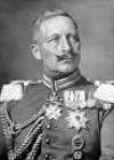
On July 5, 1914, in Berlin, Kaiser Wilhelm II of Germany pledges his country's unconditional support for whatever action Austria-Hungary chooses to take in its conflict with Serbia, a long-running rivalry thrown into crisis by the assassination, the previous June 28, of Archduke Franz Ferdinand of Austria and his wife by a Serbian nationalist during an official visit to Sarajevo, Bosnia.
Barely a week after Franz Ferdinand's murder, the Austrian Foreign Ministry sent an envoy, Alexander, Graf von Hoyos, to Berlin. Hoyos carried a memorandum from the office of the Austrian foreign secretary, Leopold Berchtold, expressing the need for action in the tumultuous Balkans region, as well as a personal letter to the same effect from Emperor Franz Josef to Kaiser Wilhelm. Both documents focused on the need for Austria-Hungary to establish an alliance with Bulgaria, in place of Romania—which Germany had previously favored as a possible Balkan ally—due to the latter nation's increasing closeness with Serbia and its powerful supporter, Russia. Neither the memorandum nor the emperor's letter specified that Austria-Hungary wanted war, but the memorandum—a new version of an earlier, less emphatic text written before Franz Ferdinand's assassination—stressed the need for immediate action, pointed to increased Serbian and Russian aggression and stated as an objective the elimination of Serbia as "a factor of political power in the Balkans."
Austria's ambassador to Germany, Ladislaus Szogyeni-Marich, passed Hoyos' two documents to the Kaiser over lunch on July 5, in Potsdam. Wilhelm was outraged by Franz Ferdinand's murder, and felt a sense of personal loss: the two had met at the archduke's country estate just two weeks before the assassination to discuss the situation in the Balkans. Though he initially demurred and said he needed to consult the German chancellor, Theobald von Bethmann Hollweg, he eventually—when pressed by the ambassador—responded with uncharacteristic decisiveness, promising Germany's "faithful support" for Austria-Hungary in whatever action it chose to take towards Serbia, even if Russia intervened. Later that afternoon, Wilhelm assembled a crown council, attended by Bethmann Hollweg, Foreign Secretary Arthur Zimmermann, and War Minister Erich von Falkenhayn, among others. From this meeting, a consensus emerged backing the Kaiser's decision, which Bethmann Hollweg subsequently relayed to the Austrian representatives and Hoyos triumphantly carried back to Vienna.
The Kaiser's pledge, which historians have referred to as the carte blanche or "blank check" assurance, marked a decisive moment in the chain of events leading up to the outbreak of the First World War in Europe during the summer of 1914. Without Germany's backing, the conflict in the Balkans might have remained localized. With Germany promising to support Austria-Hungary's punitive actions towards Serbia, even at the cost of war with Russia, whose own powerful allies included France and Great Britain, the possible Balkan War threatened to explode into a general European one.
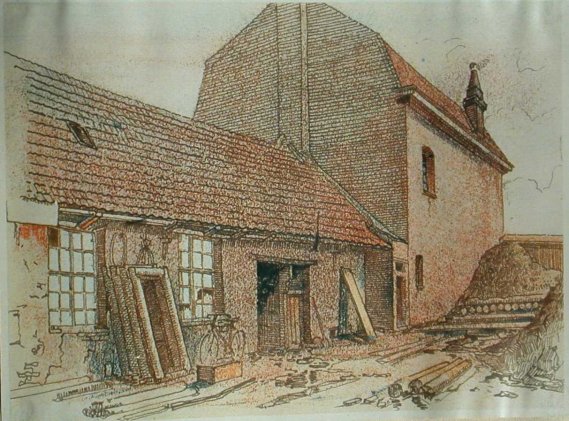
Fromelles Watercolor, 1915, by Hitler
1915 World War I: List Regiment: Gefreiter Adolf Hitler's 16 Reserve Infantry Regiment continues to occupy a position at Fromelles, on a level field with water channels, willow trees and willow stalks. In the distance towards the enemy lines lie an insignificant wood with barbed wire entanglements. Under the direction of their defense-minded commander, Lieutenant General Gustav Scanzoni von Lichtenfels, the regiment works ceaselessly day and night to further fortify their position at Fromelles while fighting off repeated assaults by the enemy. [For further details, Click here.]
1916 World War I: List Regiment: Gefreiter Adolf Hitler endures trench warfare in Flanders (Artois) with 3 Company, 16 Reserve Infantry Regiment. [For further details, Click here.]
1917 World War I: List Regiment: Gefreiter Adolf Hitler's 16th RIR remain deployed for Phase 1 operations in Flanders, Belgium. [For further details, Click here.]
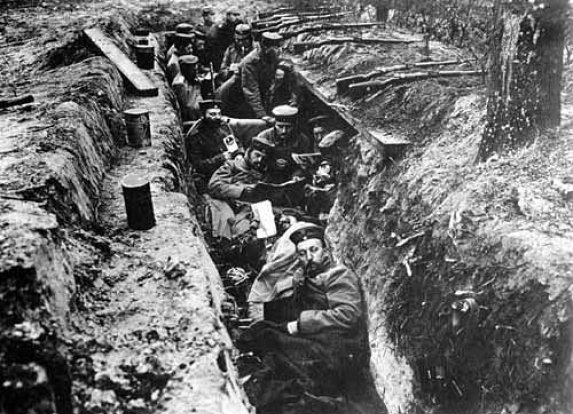
1918??? World War I (June 17-27): Gefreiter Adolf Hitler's 16th RIR endures trench warfare at Passy sur Marne. [For further details, Click here.]
1933 Various:
Church and Reich: The Catholic Center Party publishes its decree of dissolution. Only the Nazis remain as an active political party in the Reichstag. Note: The significance of these developments is far-reaching and insidious. By acquiescing in Hitler's dictatorship, the Vatican is not only interfering in the internal affairs of what was at one point a democracy, but they are helping to eliminate the only substantial domestic force capable of real resistance. And all done in the name of Anti-Communism. These sorts of events, and the way some governments (particularly in the Middle East) are in bed with religions to the detriment of their own constituencies, is the most convincing of all arguments for the separation of church and state. (THP)
[See: How Did Adolf Hitler Consolidate his Power?]Church and Reich: Cardinal Faulhaber complains to the Bavarian Council of Ministers that almost one hundred priests had been arrested in the last few weeks. The cardinal will later change his tune when he visits Hitler at his mountain retreat at Obersalzberg in November 1936. Faulhaber observed: 'Without doubt the chancellor lives in faith in God. He recognizes Christianity as the foundation of Western culture.' (THP)
Holocaust: Kemma (Rheinland) concentration camp goes into operation. (THP)
Call for order: Neville Laski, President of the Board of Deputies of British Jews, publicly opposes anti-Nazi street demonstrations and boycotts.
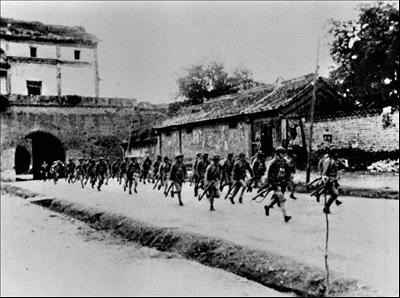
1937 China: The Chinese Communists and the Kuomintang declare that the Japanese are their common Japanese enemy and agree to work together.
1938 Various:
Austria: Trade unions in Vienna are dissolved and their funds and property are seized by the German Labor Front. The supreme goal of the Labor Front is to educate all working Germans towards a National Socialist state and in the spirit of National Socialism. It will act especially to educate those people who have decisive roles in the organizations dealing with social conditions, labor courts and social security. It will see to it that the honor of the leader of the enterprise and his followers will become a real motivating power in the new order of society and economy.
Holocaust: Evian Conference:
Between 1933 and 1941, the Nazis aimed to make Germany judenrein (cleansed of Jews) by making life so difficult for them that they would be forced to leave the country. By 1938, about 150,000 German Jews, one in four, had already fled the country. After Germany annexed Austria in March 1938, however, an additional 185,000 Jews were brought under Nazi rule. Many Jews were unable to find countries willing to take them in.
Many German and Austrian Jews tried to go to the United States but could not obtain the visas needed to enter. Even though news of the violent pogroms of November 1938 was widely reported, Americans remained reluctant to welcome Jewish refugees. In the midst of the Great Depression, many Americans believed that refugees would compete with them for jobs and overburden social programs set up to assist the needy.
Congress had set up immigration quotas in 1924 that limited the number of immigrants and discriminated against groups considered racially and ethnically undesirable. These quotas remained in place even after President Franklin D. Roosevelt, responding to mounting political pressure, called for an international conference to address the refugee problem.
In the summer of 1938, delegates from thirty-two countries met at the French resort of Evian. Roosevelt chose not to send a high-level official, such as the secretary of state, to Evian; instead, Myron C. Taylor, a businessman and close friend of Roosevelt's, represented the U.S. at the conference. During the nine-day meeting, delegate after delegate rose to express sympathy for the refugees. But most countries, including the United States and Britain, offered excuses for not letting in more refugees.
Responding to Evian, the German government was able to state with great pleasure how "astounding" it was that foreign countries criticized Germany for their treatment of the Jews, but none of them wanted to open the doors to them when "the opportunity offer[ed]."
Even efforts by some Americans to rescue children failed: the Wagner-Rogers bill, an effort to admit 20,000 endangered Jewish refugee children, was not supported by the Senate in 1939 and 1940. Widespread racial prejudices among Americans—including antisemitic attitudes held by the U.S. State Department officials—played a part in the failure to admit more refugees.
1940 World War II: Various:
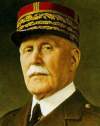
Vichy: Marshal Petain's government breaks off relations with Britain because of the attacks against the French navy at Oran and the seizure of many of its ships at Plymouth and Portsmouth. In retaliation for the British action at Mers-el-Kebir, Vichy French warships based at Dakar capture three British merchant ships, while French aircraft stationed in Morocco attack British shipping off Gibraltar.
War at Sea: The British destroyer Whirlwind is sunk by U-34 SW of Ireland.
War in the Air: The RAF carries out night raids on Kiel and Wilhelmshaven.
United States passes Export Control Act: Congress passes the Export Control Act, forbidding the exporting of aircraft parts, chemicals, and minerals without a license. This prohibition was a reaction to Japan's occupation of parts of the Indo-Chinese coast.
1941 World War II: Barbarossa: Units of 6 Armee (von Reichenau) break through the Stalin Line E of Lvov, while Panzergruppe 1 (von Kleist) continues its advance toward Zhitomir and Berdichev in the Ukraine.
1942 World War II: Various:
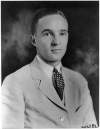
Edsel Fordof Detroit is disappointed to discover that because of strict wartime auto rationing, he is unable to get a car until his application is approved by the government. Note: Mr. Ford's family had produced over 30 million automobiles to this date.
Barbarossa: Armored units of 4 Panzerarmee (Hoth) reach the Don at Voronezh.
1943 World War II: July 5-15 Operation Citadel officially begins:
By the summer of 1943, Nazi Germany and the Soviet Union had been at war for two years. German forces had failed to crush the Soviets in the initial Barbarossa offensives, and their 1942 campaign had ended in disaster at Stalingrad (Volgograd). With the threat from the Western Allies increasing, the Germans intended to switch to a defensive strategy in the East, bleeding the Soviets white using a combination of prepared defensive lines and limited offensives.
In the spring of 1943, the German Field Marshall, von Manstein, had defeated Soviet attacks in the South, and urged new attacks in the same area. The German General Staff instead decided to launch an offensive against a large salient in the Soviet lines around the town of Kursk, and hoped to trap about a fifth of the Red Army's manpower in this attack. Although initially conceived as a limited attack, the planned scale of the operation increased time and again over the next few months, with the date repeatedly pushed back so more German forces could be assembled. By July, the Germans had gathered around 50 divisions with about 800,000 infantry troops, and 2,700 tanks including brand new Tiger and Panther tanks, as well as the equally new Elefant self-propelled assault guns.
Soviet commander, Marshal Georgy Zhukov, guessed the probable site of the German attack as early as April, and his deduction was later confirmed by intelligence from the Lucy spy ring in Switzerland. The Soviets thus prepared a massive series of concentric defensive works, including over 3,000 miles (5,000 kilometres) of trenches and over 1,000,000 mines, defended by even more men and tanks than the Germans could muster.
When the German offensive did begin on July 4th, it was quickly blunted by the Soviet defenses, and within a few days it became clear that no German breakthrough would be forthcoming.
1944 World War II: Various:
War at Sea: German mini-U-boats begin operations off the Normandy coast, sinking 4 small Allied warships and damaging the British cruiser Dragon.
From a poorly identified captured German IMT document concerning a Hitler decree:
According to press reports, the Anglo-Americans intend in the future to attack from the air small places, too, which are of no importance militarily or to the war economy, as a retaliatory measure against the V-1. Should this news prove true, the Fuehrer wishes it to be made known through the radio and the press that any enemy airman who takes part in such an attack and is shot down will not be entitled to be treated as a prisoner of war, but, as soon as he falls into German hands, will be treated as a murderer and killed. This measure is to apply to all attacks on small places which are not military targets, communications centers, armament targets, and the like, and therefore, are not of importance to the conduct of war. At the moment nothing is to be ordered; the only thing to be done is to discuss such a measure with the Wi. Ru and the Foreign Office.
[See: Wunderwaffen: Hitler's Deception and the History of Rocketry.]1945 World War II: Various:
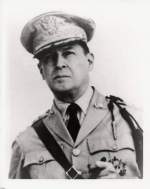
War in the Pacific: General MacArthur announces that the Philippines have been completely liberated. Not only has the Japanese army lost more than 400,000 of its best troops in the campaign, but with the fall of the Philippines, Japan's supply lines are cut.
Churchill to Dominion Prime Ministers:

In the most rigid secrecy, Stalin informed Roosevelt and myself at the Crimea Conference, of the Soviet Government's willingness to enter the war against Japan, two or three months after Germany's surrender, on the conditions stated below: (a) Preservation of the status quo in Outer Mongolia. (b) Restoration of the Russian rights lost in the year 1904, viz: (i) Recovery of Southern Sakhalin and the islands adjacent to it. (ii) Internationalization of the port of Dairen, with safeguards for the pre-eminent interests of the USSR and restoration of the lease of Port Arthur as a Soviet naval station. (iii) Joint operation of a Soviet-Chinese company of the Chinese Eastern Railway and the Southern Manchurian Railway, providing an outlet to Dairen, on the understanding that the pre-eminent interests of the USSR will be safeguarded, and that China will retain full sovereignty in Manchuria. (c) Acquisition by the USSR of the Kurile Islands.
Poland: Both Britain and the US recognize the new Russian puppet government. Britain and USA announce they no longer recognize the legitimate Polish Government-in-Exile in London. Polish soldiers and civilians in the British Commonwealth and elsewhere are pressured to return to a Poland under Soviet control. Most refuse.
The British election is held—but the results will not be released until July 26—because of the time required to bring home and count the soldier's votes. Note: When the results are in, Winston Churchill, who had led his nation through much of World War II, is defeated, as the Labour Party under Clement Atlee sweeps to power.
1946 Various:
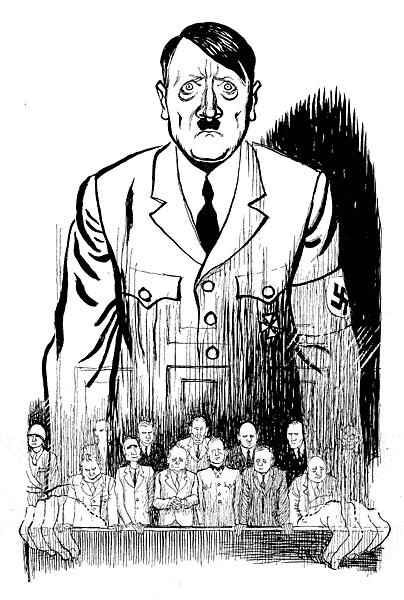
Nuremberg Tribunal: Defense summations continue in the Major War Criminals Trial. One point in common with nearly all of the arguments of the various Defense Counsel is that there is a major absence among the Defendants; Adolf Hitler himself.
Dr. Otto Stahmer, Defense Counsel for Hermann Goering:At different times Hitler made addresses to the commanders-in-chief of the Armed Forces, thus for instance in November 1937, on 23 May 1939, and on 22 August 1939. The Defendant Goering at his personal interrogation has already given extensive explanations as to the importance and the purpose of these addresses. For the question of whether the fact that he was present at these addresses might constitute perhaps a complicity in a conspiracy in the sense of the Indictment, it is important that on these occasions Hitler solely and one-sidedly made known his own opinion about military and political questions. The participants were only informed of what possible political developments Hitler expected. The participants were never asked for their opinion nor had they even any possibility to express their criticism of Hitler's opinion. Hitler did not ask his generals to understand his orders; all he asked of them was to carry them out.
His autocratic leadership of the State was exclusively directed by the principle sic volo, sic jubeo, which he carried through to its logical conclusion. How rigidly Hitler followed this principle can be seen from the fact that after the address of 23 May 1939.
as Milch stated in his testimony-he expressly forbade all participants to comment on the speech, even among themselves. That Hitler was irrevocably resolved on an aggressive war could not be deduced by the listeners of the said speeches, and they did not do so. This has been confirmed unanimously by all witnesses who were present when those addresses were given.
At that time Hitler had actually not yet planned a war. In that respect the testimony of Field Marshal Milch is very informative. When the witness, in the months following the speech of 23 May 1939, repeatedly pointed out to Hitler in personal reports that the Air Force was not ready for action with its bombing squadrons and had hardly any stocks of bombs, Hitler refused to give an order for the production of bombs and remarked that this manufacturing was unnecessary and superfluous. Hitler persisted in this refusal, although Milch pointed out that the production would take several months. An order to that effect was given by Hitler only on 20 October 1939.
Hitler's discourse before the commanders-in-chief can be easily explained by the odd inclination of Hitler frequently to develop political ideas without ever thinking of their realization. In each case his practical policy resulted from the requirements of the actual development. [For the full text of today's proceedings, Click here.]
Bikini: French designer Louis Reard unveils a daring two-piece swimsuit at the Piscine Molitor, a popular swimming pool in Paris. Parisian showgirl Micheline Bernardini modeled the new fashion, which Reard dubbed "bikini," inspired by a news-making U.S. atomic test that took place off the Bikini Atoll in the Pacific Ocean earlier that week. [For further information, click here.]
1947 Spandau Prison: From Spandau: The Secret Diaries, by Albert Speer:
Together with Schirach, Hess, who months ago was complaining of acute circulatory weakness with unbearable cardiac pain, has been tramping for hours around the garden at a brisk pace without pause. Both men have again made contact with each other, and Schirach has since seemed somewhat more relaxed. With Hess he feels superior; taking the lead with Hess suits his disposition. But Hess, too, seems more balanced. Sometimes I think that something like a friendship is slowly developing between them. If so, it would be the first that has come about in Spandau. (Speer II)
1959 Cold War: Reactions to Soviet exhibition in New York:
The New York Times says American visitors to the Soviet National Exhibition in New York City are expressing very strong views of Russian society and economics in the "guest books" located throughout the exhibition. The generally negative, and often angry, comments indicated that cultural exchanges between the United States and the Soviet Union did not necessarily bring the two nations closer together in understanding.
1975 Death: Otto Skorzeny: Obersturmbannfuehrer in the German Waffen-SS during World War II. After fighting on the Eastern Front, he is known as the commando leader who rescued Benito Mussolini from imprisonment after his overthrow. He also was the initiator of Operation Greif, for which he was judged after the war: this special operation involved false flag tactics, that is wearing the uniform of the enemy to confuse him and advance into his lines. He also helped train the Werewolves, a Nazi stay-behind organisation which tried to engage in guerrilla warfare against the Allies, and organized the Nazi 'ratlines,' which formed the basis of the ODESSA network after the war, which helped exfiltrate Nazi war criminals to Franquist Spain and other friendly countries (in particular South America). After creating the Paladin Group in 1970, he died a few months before Franco himself, in July 1975.
2002 Death: Friedrich Engel: at the age of 97, a former Nazi SS officer known as the "Butcher of Genoa." He was buried in a private ceremony in the German city of Hamburg last week, according to the prosecutor's office.
Engel earned his "butcher" nickname for his alleged part in the wartime massacre of 59 Italian prisoners. In 2002 a Hamburg court found him guilty of murder, but the ruling was overturned by a higher court which cited insufficient evidence. In the 2002 trial, a lower court in Hamburg ruled that Engel had ordered the execution of the Italian naval commandos. The incident, in May 1944, took place on a mountain pass outside Genoa, in northern Italy, in revenge for an attack on a cinema which killed five German soldiers. Head of the SS in the city at the time, Engel said he had observed the event but did not supervise the executions.
He blamed Nazi naval officers for the shootings, but the court found him guilty of murder and sentenced him to seven years in jail. Due to his age, his sentence was suspended, and after Germany's Federal Court of Justice threw out the conviction in 2004, it said a retrial would not take place due to Engel's advanced age.
2006 North Korea: The United Nations Security Council holds an emergency meeting hours after North Korea reportedly tests at least seven separate ballistic missiles. [For further information, click here.]
Edited by Levi Bookin (Copy editor)
levi.bookin@gmail.com



Click to join 3rdReichStudies



Disclaimer: This site includes diverse and controversial materials—such as excerpts from the writings of racists and anti-Semites—so that its readers can learn the nature and extent of hate and anti-Semitic discourse. It is our sincere belief that only the informed citizen can prevail over the ignorance of Racialist "thought." Far from approving these writings, this site condemns racism in all of its forms and manifestations.
Fair Use Notice: This site may contain copyrighted material the use of which has not always been specifically authorized by the copyright owner. We are making such material available in our efforts to advance understanding of historical, political, human rights, economic, democracy, scientific, environmental, and social justice issues, etc. We believe this constitutes a "fair use" of any such copyrighted material as provided for in section 107 of the US Copyright Law. In accordance with Title 17 U.S.C. Section 107, the material on this site is distributed without profit to those who have expressed a prior interest in receiving the included information for research and educational purposes. If you wish to use copyrighted material from this site for purposes of your own that go beyond 'fair use', you must obtain permission from the copyright owner.
Please Note: The list-owner and moderators of 3rdReichStudies are not responsible for, and do not necessarily approve of, the random ads placed on our pages by our web server. They are, unfortunately, the price one pays for a 'free' website.